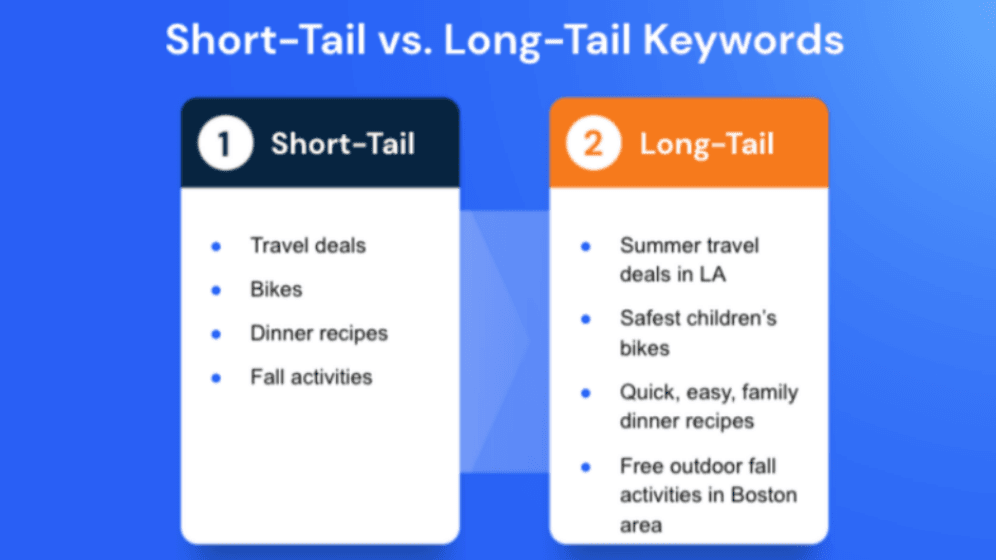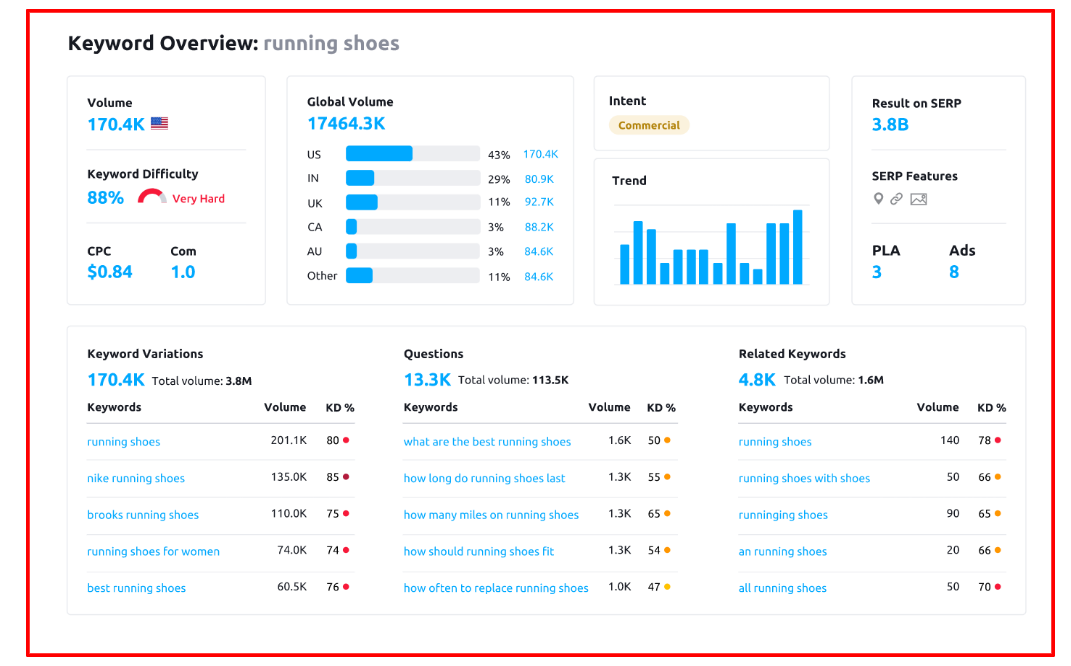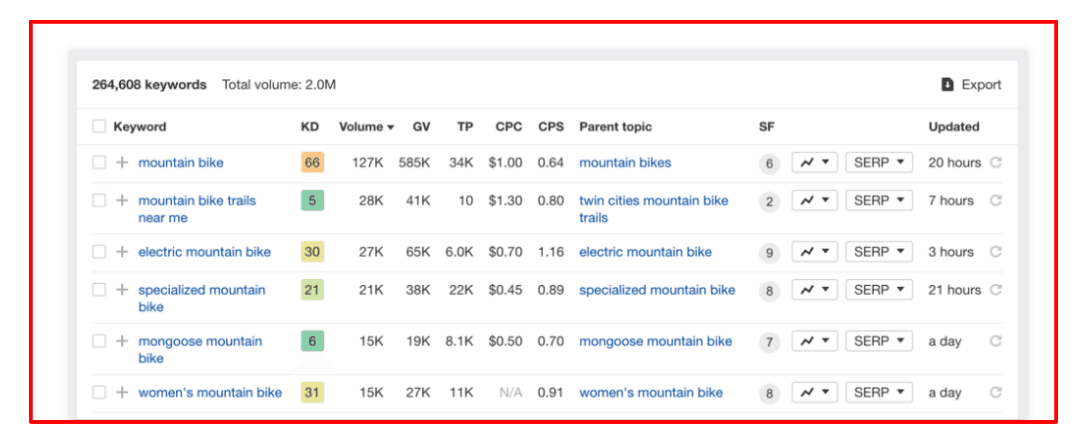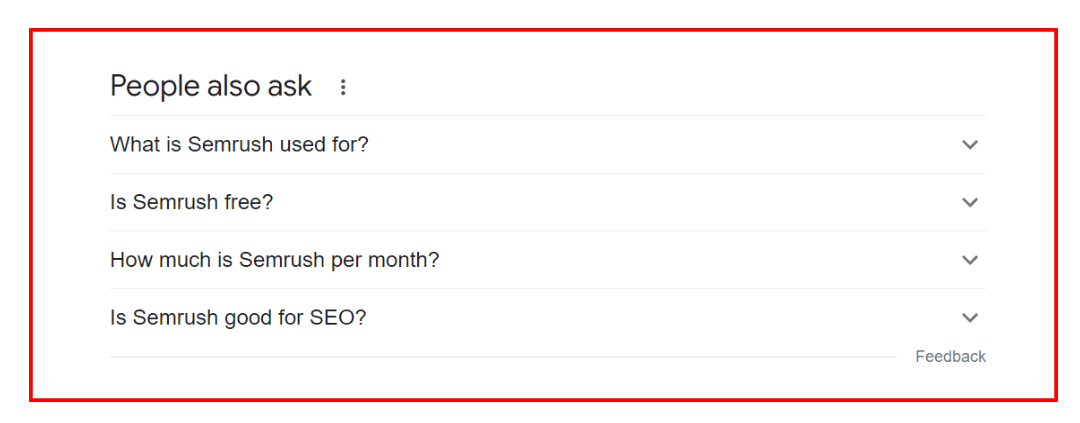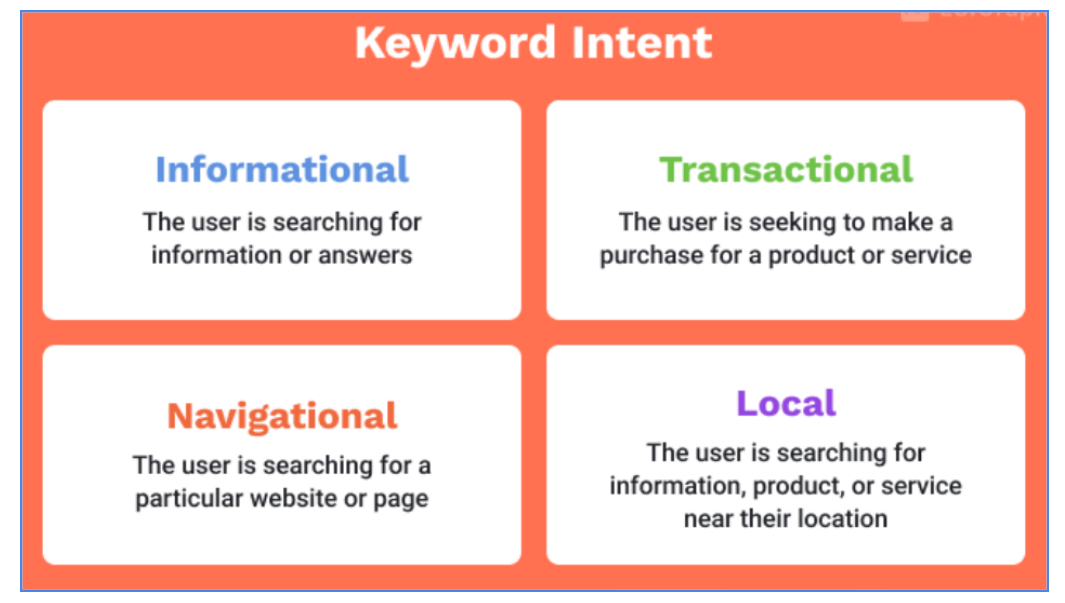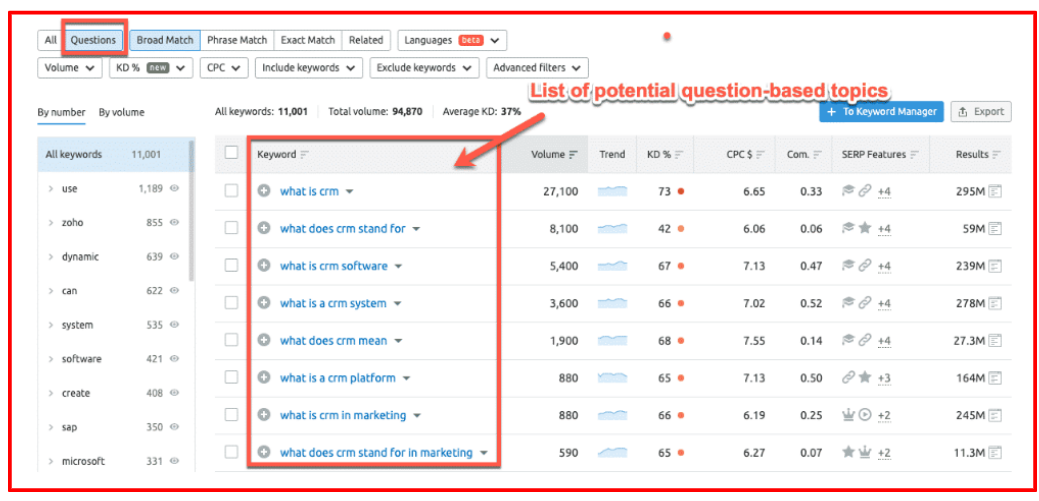1. What Are Keywords?
Keywords, a fundamental part of SEO, are phrases people use to search for information on search engines like Google.
Search terms or keywords are categorized into two main types: short tail and long tail keywords.
Short tail keywords are broad and general, consisting of one or two words — often highly competitive and challenging to rank for.
Conversely, long tail keywords are more specific and longer phrases consisting of three or more words — less competitive and easier to rank for but with lower search volumes.
2. What Is Keyword Research?
Keyword research, also known as keyword analysis, is considered one of the most important parts of Search Engine Optimization (SEO) and involves finding and analyzing search terms used when searching for information on the internet.
Conducting keyword research for SEO is the process of identifying relevant keywords to improve search engine rankings and target the right audience. It is a vital component of on-site SEO that helps website owners optimize their content for higher rankings on Google.
Keyword research is primarily done to identify a website’s most relevant and profitable keywords, often referred to as SEO keywords. It entails several steps, such as determining your website’s target audience and how they find it through search engines, investigating the keywords used by your competitors, and using specialized software to analyze factors like search volumes, difficulty, and relevance.
To perform keyword research effectively, you can use a keyword tool or SEO tool to analyze keyword data and uncover valuable opportunities. When analyzing your competitors’ keywords, conducting a keyword gap analysis helps you find relevant keywords that your site is missing, which can boost your SEO efforts. Additionally, keyword search is the process of checking how often certain keywords are searched, providing insight into their popularity and competition.
Once you have identified the most relevant keywords, you can optimize your website’s content by incorporating them into your headlines, subheadings, meta tags, and body text.
To conduct successful keyword research, you need to know your audience, the search terms they use, and the keywords already used by your competitors.
3. Why Is Keyword Research Important?
Effective Keyword research is essential to on-site SEO, can help improve your position in the organic search results and on the search engine results page, leading to better keyword rankings. Therefore businesses must understand its importance.
Some of the many benefits of keyword research include the following:
1. Keyword Research Helps You Know Your Audience
Learning about your target audience is invaluable if you want to grow and succeed with a website, but it’s not always easy. That’s why keyword research should be an important part of your strategy – it allows you to track the keywords that bring visitors to your site to gain insight into their preferences and needs. This will give you the data necessary for making informed decisions regarding how best to engage them.
2. Keyword Research Can Help Boost Conversions
Effective keyword research allows you to attract the right audience and rank higher on the SERPs for the right terms, which leads to more website visit conversions. Targeting commercial keywords (terms that indicate purchase intent) can be especially valuable for increasing conversions, as they focus on users who are ready to buy. In other words, visitors already interested in your products will be more likely to convert
3. Keyword Research Helps You Outrank Your Competitors
Staying one step ahead of the competition is easy with keyword research. By assessing and analyzing your competitors’ keywords, you can create content tailored to niche-specific words – helping you outrank them and draw in more website visitors. In short, keyword research effectively lets you capitalize on your competition.
4. Keyword Research Improves Website Visibility
Keyword research allows website owners to improve their website’s search engine rankings. They can improve their website’s visibility and authority in Google by optimizing their content with relevant keywords, leading to higher search engine rankings.
4. What Makes a Good Keyword?
Keyword research involves identifying and analyzing search terms that people use when searching for information on the internet. However, not all keywords have the same value. Therefore when evaluating keywords, it’s important to target those with high search volumes to maximize your content’s visibility and potential traffic.
Here are four essential elements that make a good keyword:
1. Search Volume
Search volume refers to the number of monthly searches a particular keyword receives. More people are likely to visit your site if you use a keyword with a high average monthly search volume, while fewer people will be interested in keywords with a lower or zero search volume. However, we recommend balancing high and low-search volume keywords for a better shot in the SERPs.
2. Competition
The term “competition” describes the number of sites competing for the same search term. Keywords with low competition are easier to rank, while those with high competition are more difficult. This is why newer (low authority) website owners are likelier to go for low-competition keywords for a better chance to rank higher in the search engine results.
3. Relevance
Relevance refers to how closely a keyword matches the content of your website. Using the right keywords can boost your website’s visibility in search engine results and attract your target demographic. We recommend using keywords relevant to your content and audience rather than targeting the highest search volume or low-competition keywords.
4. Authority
Your website’s authority is measured by how much trust and credibility search engines have in it and how many websites link back to it. Low-authority websites will find it hard to rank higher for head terms (short tail keywords), while higher authority websites could climb up the SERPs quickly for the same head terms.
5. When Keyword Research is Needed
Keyword research is a critical aspect of any digital marketing strategy. After setting up your website, use website analytics tools to analyze your organic search traffic bucket and identify the keywords visitors are already using to find your website.
Here are three instances when you need to conduct keyword research:
1. For SEO
Search Engine Optimisation (SEO) involves adjusting various aspects of a website to raise its visibility in SERPs.
By conducting keyword research, you can learn which queries your ideal customers use to find content or products related to yours on the web.
2. To Fuel Your Content Strategy
The search habits of your intended audience are a gold mine of information that can help you tailor your content to your readers or ideal customers. While content is king, researching the right keywords and incorporating them into your article will help its visibility online. After all, who would want to adopt the write, publish, pray, and hope strategy?
3. For Paid Campaigns
Keyword research is crucial in creating effective paid search campaigns. You can create more relevant ads for your target audience if you know the keyword phrases they use in Google. Proper keyword optimization can also help boost your ad’s click-through rate (CTR) and attract more interested customers.
6. Researching Keywords
Doing keyword research can seem daunting if you have no idea where to begin your digital marketing campaign. However, using the best keyword research tool can help you identify keywords that indicate mid to bottom-funnel interest, which often have lower search volumes but higher conversion rates. If you’re on a budget, a free keyword research tool can also provide valuable insights such as keyword ideas, search volume, and niche identification without any cost.
Here, we’ll show you how to conduct keyword research the right way so you can boost your website’s SEO and attract more users.
Seed Keywords
Seed keywords are the primary keywords or topics that are related to your website’s content or business. They are essential because they provide a starting point for your research and help you generate more relevant and specific keywords.
One competitive advantage of using seed keywords is that they can help you discover untapped keywords that your competitors are yet to find. The only downside to seed terms is that most will require a higher authority (Domain Authority or Domain Rating) to at least have a chance of securing the top spots on SERPs.
How to Find Seed Keywords
Start by brainstorming the primary topics related to your website or business. Think about what your audience would search for when looking for products or services.
You can also use tools like Google Keyword Planner, Ahrefs, or SEMrush to generate new keyword ideas based on your seed keywords. These tools provide valuable insights on monthly search volume, competition, and related keywords that can help you identify the best seed keywords to target.
Expanding Your Search
After finding your seed keywords, it’s time to expand your search. You can use tools like Google Autosuggest or “People also ask” to find related keywords and questions that your audience is searching for. This approach allows you to identify long tail keywords that are more specific and have less competition.
In addition, you can find out what questions people have about your field by exploring online communities, discussion boards, and social media websites. This can help you identify gaps in the market and create content that addresses those needs.
Time to Refine Those Keywords
By refining your keywords, you can only build an effective SEO strategy that attracts organic visitors. After compiling your keyword lists, refine them to ensure they are relevant to your target audience and receive sufficient monthly search volume.
Keyword tools like Ahrefs or SEMrush can provide keyword difficulty metrics to determine how difficult it is to rank for a specific keyword. Furthermore, you can examine the intent behind each keyword to tailor your writing to your readers’ expectations.
Understanding Search Intent
Understanding search intent is another critical aspect of effective keyword research. Google classifies search queries into four types based on intent: navigational, informational, transactional, and local. Each search query type has a specific intent that can help you tailor your content to your audience’s needs.
Navigational
When a user is trying to locate a particular website or web page, they engage in a navigational search. Users who conduct these searches have a specific brand name or website in mind and are just trying to find it quickly.
Brand or product-specific navigational keywords improve a page’s visibility in search engine results and ultimately increase website traffic.
Informational
A user conducts an informational search to learn more about a particular subject, product, or service. Keywords like “how to,” “what is,” “why,” and “best practices” are common in searches for informative content because they serve to educate and inform the user.
Making your brand known as a go-to information resource in your industry by publishing high-quality, informative content can increase site visits.
Transactional
Users conduct transactional searches when they have the intention to make a purchase. Some examples of these queries are the search terms “buy,” “purchase,” “discount,” and “coupon.”
A transactional keyword is designed to help businesses make more sales by informing site visitors about available products and services and piquing their interest enough to make a purchase.
Local Searches
Users conduct local searches for a service or good in a specific location. People searching for something specific in their immediate vicinity will often use phrases like “coffee shop near me” or “best pizza in Los Angeles” in their queries.
Including keywords and information about your location in your content creation process can boost your company’s visibility in local search results and bring in more customers in your area.
Finding Long Tail Keywords
Finally, finding long tail keywords that are more specific and have lower competition is crucial. Long tail keywords can help you attract a more targeted audience and improve your website’s visibility in SERPs.
7. Prioritizing Keywords
Regarding SEO, not all keywords are created equal – some may be more beneficial for you in achieving your desired business outcomes. This is why keyword prioritization exists: to help identify which words will provide maximum value and advance toward your goals. In this section, we will discuss how to prioritize keywords effectively.
1. Establish Your Goals
Before you start prioritizing your keywords, you need to establish your goals. What are you hoping to accomplish with your website? Is it to drive traffic, generate leads, increase sales, or improve brand awareness?
A firm grasp of your final objectives will help you zero in on the best keywords to use in your search.
2. Analyze Keyword Metrics
One of the most important factors to consider when prioritizing keywords is their search volume and competition. It’s recommended to go after keywords with high search volume and low competition to stand a better chance of ranking higher in the SERPs.
Tools like Ahrefs and Google’s Keyword Planner can help you analyze keywords and determine their popularity, competition, and other metrics.
3. Consider Intent
Understanding the intent behind organic search queries is crucial when prioritizing keywords. As discussed earlier, search queries can be navigational, informational, and transactional, and local. For example, transactional keywords will help you drive conversions, while informational ones could help you build brand awareness.
4. Align with Your Content Strategy
Keyword selection is a critical component of any successful content strategy. The words you pick must flow naturally with the main subject of your site, which will benefit both search engine rankings and customers.
5. Continuously Monitor and Refine
Keyword prioritization is not a one-time process. Regularly reviewing and adjusting your keyword strategy is the best way to ensure you focus on the right keywords. Monitor your website’s search engine rankings, track your competitors’ keywords, and adjust your strategy accordingly.
8. Analyzing the Keywords
Analyzing your keywords is crucial to ensure your efforts are well-spent and you’re optimizing for the right terms. Here are the metrics you need to monitor when carrying our keyword analysis for SEO:
Search Volume
Search volume is a crucial metric to consider when analyzing keywords. It indicates the number of people searching for a specific keyword on search engines like Google. Higher volumes mean more demand for a specific keyword, making it a potentially valuable target for your website.
The Cost Per Click (CPC)
Cost per click (CPC) is a metric that shows how much advertisers pay on average for each click on an ad triggered by the keyword being searched. Higher CPCs generally indicate more competition for the keyword, which could mean it’s a valuable target for your website.
SERP Features
SERP features are non-organic results that appear on search engine results pages. These can include ads, featured snippets, knowledge graphs, and more. Analyzing SERP features for a particular keyword can help you determine how competitive it is and whether it’s worth targeting.
SERP Results
Analyzing the organic results for a keyword is another crucial step in keyword analysis. Look at the top-ranking pages and assess their content and relevance to the keyword. It will help you determine what content you should produce to achieve higher rankings for the target keyword.
Keyword Difficulty
Keyword difficulty is a metric that estimates how hard it is to rank for a particular keyword. Different tools use different algorithms to calculate keyword difficulty, but generally, higher values mean the keyword is more competitive and harder to rank for.
Check for Page Authority
Page authority is a critical factor to consider when analyzing keyword competition because it measures the strength of a particular webpage. Pages with high page authority are more likely to rank well in SERPs. You can use tools like Moz’s Page Authority Checker, Ahrefs’s Domain Rating, or SEMrush to determine the page authority of a webpage.
If the top-ranking pages for a keyword have high page authority, it indicates that they have built up a strong reputation and have a lot of quality backlinks. And this means it could be more difficult to outrank those already ranking higher on the SERPs, especially if your website or webpage has a lower page authority.
Check for the Number of Backlinks
Obtaining backlinks from other websites to your page is integral for determining your webpage’s authority and potential to rank for a specific keyword.
Analyzing the backlinks of top-ranking pages for a keyword can help you understand the link building efforts you may need to undertake.
Check for Domain Authority
Domain authority (DA) is an essential metric to consider when analyzing keywords because it can directly impact your website’s ability to rank for certain keywords. DA is based on various metrics, such as the quantity and quality of backlinks, the domain’s age, and the site’s general credibility and usefulness.
If the top-ranking pages for a keyword have high domain authority, it may be more difficult to outrank them, even if your blog post has similar or even better quality. This is because Google considers websites with high domain authority more trustworthy and authoritative.
You can use tools like Moz’s Domain Authority Checker or Ahrefs’ Domain Rating to check a website’s domain authority. These tools provide a score on a scale of 0 to 100, representing the website’s overall authority.
9. Question Keyword Research
When it comes to keyword research, one area that is often overlooked is question keywords. They include questions like “what,” “how,” “why,” and “where.”
By answering these queries, you can provide quick answers to your audience and establish yourself as an authority in your niche.
In this section, we will explore how to do keyword research for question keywords.
The first step in researching question keywords is understanding the query’s intent. Is the user researching a topic, trying to solve a problem, or shopping for a specific item? After fully grasping the intent, you can begin brainstorming a keyword list.
Next, you can use keyword tools to expand your list and identify each keyword’s search volume and competition level. Look for long tail keywords relevant to your niche and have a decent search volume but low competition. These keywords may have less traffic, but they can be easier to rank for and provide more targeted traffic to your site.
You should also provide a comprehensive answer when creating content for question keywords. Use subheadings to break down your blog post into digestible sections and provide supporting examples, images, and videos where possible. This will help you drive more traffic to your site and establish yourself as a thought leader in your niche.
10. PPC Keyword Research
PPC (pay-per-click) marketing is an efficient and effective way for businesses to reach their customers. Companies can display their ads at the top of SERPs and drive relevant traffic to their website by bidding on specific keywords.
However, you must conduct extensive keyword research to maximize your PPC campaigns’ effectiveness. Here are some steps to follow:
1. Set Your Campaign’s Objectives
Before beginning your keyword research, you need to know what you want from this campaign. What do you want to achieve with your PPC campaign? Are you trying to boost site visits, product sales, or new client inquiries? Your goals will influence the keywords you choose to bid on.
2. Create a List of Seed Keywords
Like SEO keyword research, you need to start with a list of seed keywords. Simply put, these are the words that best define what you do. Use tools like Google Ads Keyword Planner, Ubersuggest, or SEMrush to generate a list of relevant search terms.
3. Analyze Keyword Metrics
Once you have a list of keywords, analyze their metrics. Look at their search volume, competition, and cost per click (CPC). You want to find keywords with decent search volume, low competition, and a reasonable CPC.
4. Refine Your List
After analyzing the metrics, refine your list of keywords. Remove keywords with high competition or CPCs that are outside of your budget. Select keywords that relate to your business and have a high click-through rate.
5. Use Negative Keywords
Using negative keywords is an essential aspect of PPC keyword research. Negative keywords allow you to exclude search terms that are not relevant to your business or that may attract low-quality traffic. Excluding these terms will enable you to improve the quality of your traffic and increase your chances of converting visitors into customers.
Start by identifying terms that are not relevant to your business. If you’re selling high-end luxury watches, you might not want to show up for searches for “cheap watches,” “affordable watches,” or “discount watches.” Users searching for these phrases are probably interested in something other than your high-end goods and services but in your more affordable items.
You can add negative keywords to your PPC campaigns in your advertising platform’s keyword management tools. Review your negative keywords regularly and adjust them to ensure that your ads only show to the most relevant and valuable audiences.
6. Monitor and Optimize Your Campaigns
Once your PPC campaigns are up and running, monitor their performance regularly on Google analytics. Click-through rate (CTR), conversion rate, and cost-per-conversion can all be monitored with the help of platforms like Google Ads and Bing Ads. Use this data from your google ads account to optimize your campaigns and improve their performance over time.
These steps will help you do effective keyword research for your PPC campaigns and drive relevant traffic to your website.
11. Incorporating Keywords
Incorporating the right keywords into your content pages is crucial for SEO success. Here are some tips to help you seamlessly integrate keywords into your content:
1. Use the Proper Density
Aim to include your target keyword naturally within the content, but avoid keyword stuffing, which can harm your rankings. A density of around 1-2% is appropriate.
2. Use Variations
You can improve your search engine rankings for related searches by using variations of your primary keyword. If “SEO tools” is your primary focus, you could also use variations such as “tools for SEO” or “SEO software.”
3. Use Headings and Subheadings
Using headings and subheadings with your target keyword helps Google better understand your content’s structure and how it relates to a particular query.
4. Use in the First and Last Paragraphs
One way to show Google that your content is relevant to a query is to use the keyword phrase you want to rank for in your content’s first and last paragraphs.
5. Use Alt Tags
Including target keywords in image alt tags can help Google understand the context of your content.
6. Use Internal Linking
Linking to other relevant pages on your site with target keywords as anchor text can help Google understand the relationships between different pages and the relevance of your content.
Remember that it’s equally as essential to create high-quality, informative content that provides value to your audience as it is to incorporate keywords into your content.
12. Keyword Research Tools
Keyword research tools play a crucial role in the success of any SEO campaign. There are a lot of free keyword research tools out there, but only a few are truly exceptional.
Here are five of the best keyword research tools to consider:
1. Google Search Console
Google Search Console is a free keyword tool from Google, and is essential for any website owner. You can use it to learn important information about your website’s performance, such as which keywords bring in the most visitors.
2. Google’s Keyword Planner
This tool is designed specifically for Google Ads campaigns but can also be used for SEO keyword research. It provides relevant keyword ideas, google trends, search volume data, and estimated cost per click (CPC) for each keyword.
3. Keyword Planner
This keyword research tool is part of the SEMrush suite of SEO tools and provides keyword suggestions, search volume data, and keyword difficulty scores.
4. Ahrefs Keyword Explorer
Ahrefs is a popular SEO toolset, and their keyword explorer tool provides a wealth of information on each keyword, including search volume, keyword difficulty, and top-ranking pages.
5. Keyword Chef
This tool uses artificial intelligence and natural language processing to suggest long tail keyword variations based on a seed keyword. It provides search volume and keyword difficulty data for each suggestion.
13. Final Thoughts
You now have a solid understanding of how to do effective keyword research for on-site SEO and PPC campaigns. Once you implement the strategies and tools we’ve discussed, you’ll be well on your way to driving more traffic and conversions to your website. Remember to continually refine and update your keyword strategy as search trends and algorithms evolve.
Meanwhile, here are some important takeaways to keep in mind:
- Keyword research is crucial for SEO, content strategy, and paid campaigns.
- A good keyword has high search volume, low competition, relevance, and authority.
- There are four types of search queries: navigational, informational, transactional, and local.
- Use tools like Google Search Console, Google Keyword Planner, and Ahrefs Keyword Explorer to research keywords.
- Incorporate keywords into your content pages and prioritize them based on their importance.
- Continuously analyze and refine your keyword research to stay ahead of the competition.
We hope this article has provided valuable insights and practical tips for your keyword research. Don’t hesitate to put your newfound knowledge to work and start optimizing your website for Google.
Remember, the keyword research process is an ongoing endeavor, so keep experimenting with different strategies to find what works best for you. Good luck!
Article Contents 
- 1. What Are Keywords?
- 2. What Is Keyword Research?
- 3. Why Is Keyword Research Important?
- 4. What Makes a Good Keyword?
- 5. When Keyword Research is Needed
- 6. Researching Keywords
- 7. Prioritizing Keywords
- 8. Analyzing the Keywords
- 9. Question Keyword Research
- 10. PPC Keyword Research
- 11. Incorporating Keywords
- 12. Keyword Research Tools
- 13. Final Thoughts


Join 18,000+ Businesses Growing with Rhino Rank
Sign Up

 Back to Academy
Back to Academy